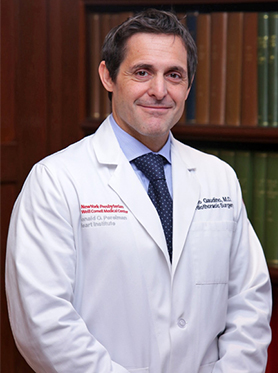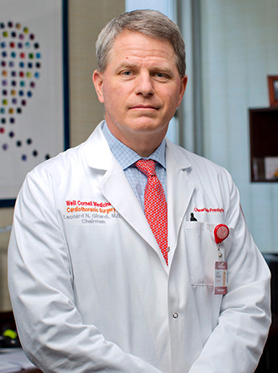Weill Cornell Medicine and NewYork-Presbyterian investigators have established that a procedure during cardiac surgery was associated with a 56 percent reduction in the incidence of atrial fibrillation with no added risks or side effects. Their findings in a recent study suggest that posterior left pericardiotomy has significant potential for preventing prolonged hospital stays and the need for additional interventions and drugs to reduce the risk of strokes and heart failure associated with atrial fibrillation.
Dr. Mario Gaudino
Dr. Leonard Girardi
The study evaluated whether a posterior left pericardiotomy, a surgical maneuver that drains the pericardial space into the left pleural cavity, could help prevent atrial fibrillation in patients who underwent cardiac surgeries. Results of the randomized controlled trial were published in the December 4, 2021, issue of The Lancet. Study investigators also presented their findings in a live virtual late-breaking science session on November 14 as part of the American Heart Association’s Scientific Sessions 2021.
“Previous studies were small with major limitations in study design, so there was no clear direction on whether posterior left pericardiotomy was beneficial for preventing atrial fibrillation,” says lead investigator Mario Gaudino, MD, the Stephen and Suzanne Weiss Professor in Cardiothoracic Surgery at Weill Cornell Medicine and a cardiothoracic surgeon at NewYork-Presbyterian/Weill Cornell Medical Center. “Our study is the first to provide rigorous evidence of the benefits of the technique in a large group of patients at a single institution.”
Excess fluid and small clots are common after cardiac surgery, occurring in about two-thirds of patients. Even a small buildup can trigger the development of atrial fibrillation, the most frequent adverse event after heart surgery reported in about 35 percent of patients. Treatment may involve an electrical shock to restore a regular heart rhythm, followed by medications to control heart rhythm and lower the risk of blood clots, all of which have side effects and complications.
The posterior left pericardiotomy procedure adds just a few minutes to the overall cardiac surgery time. A left pleural drainage tube is inserted and generally removed a few days after surgery as part of standard care. Excess fluid continues to drain through the slit in the pericardium until it heals on its own.
In their study, the investigators randomly assigned 420 patients undergoing elective surgery to coronary arteries, the aortic valve, or ascending aorta to two groups: 212 patients received a posterior left pericardiotomy during their surgeries and 208 patients did not undergo the additional surgical procedure. Atrial fibrillation developed in 37 of 212 patients (18 percent) in the pericardiotomy group, significantly lower than 66 of 208 patients (32 percent) in the non-pericardiotomy group. Importantly, no complications were associated with pericardiotomies.
We are excited that our proof-of-concept clinical trial has demonstrated the benefits of posterior left pericardiotomy, with no additional risks to patients. We look forward to confirming our results in a multicenter study in the future and hope this technique may one day become the standard of care for heart surgery patients across the globe.
— Leonard N. Girardi, MD, Cardiothoracic Surgeon-in-Chief at NewYork-Presbyterian/Weill Cornell and senior author on the study
“This study demonstrates our commitment to conducting rigorous clinical research and answering important questions that are meaningful to patients,” says Dr. Gaudino, who is also Director of the Joint Clinical Trials Office at Weill Cornell Medicine and NewYork-Presbyterian. Dr. Gaudino and colleagues in the Department of Cardiothoracic Surgery at Weill Cornell Medicine are now working with international collaborators to design a multicenter clinical trial that will include more patients and types of heart surgeries, such as mitral valve repair.





